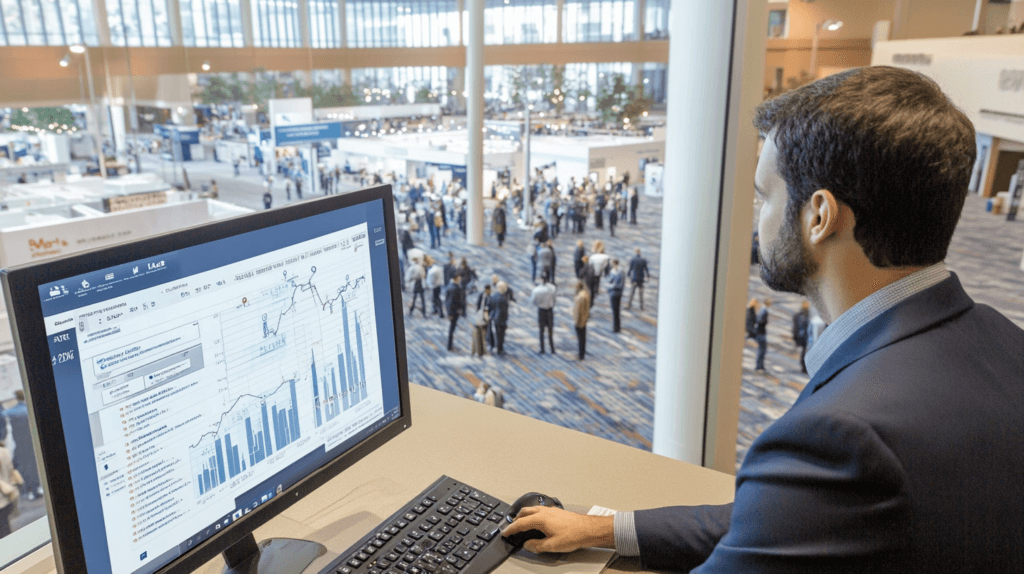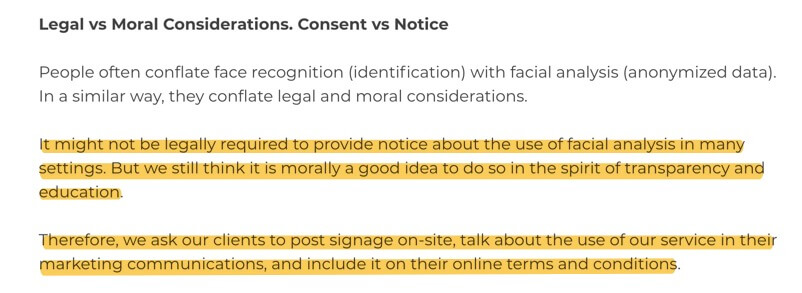 Event attendees need to be aware of the growing trend of unannounced use of facial analysis technology at meetings. Attendees to the International Association of Exhibitions and Events [IAEE]‘s December 2024 Expo! Expo! should read this post.
Event attendees need to be aware of the growing trend of unannounced use of facial analysis technology at meetings. Attendees to the International Association of Exhibitions and Events [IAEE]‘s December 2024 Expo! Expo! should read this post.
As recently reported by MeetingsNet, Expo! Expo! “will offer all exhibitors access to Zenus AI’s facial-analysis technology after a limited rollout at the 2023 [show]”. However, MeetingsNet also includes the following statement:
“Nicole Bowman, vice president of marketing and communications for IAEE, says that because the technology ‘gives anonymized sentiment about areas [of the show floor], we would not need to, nor did we in 2023, notify attendees’ that it was being used.” [emphasis added]
—Rob Carey, MeetingsNet, Expanded Use of Facial Analysis Coming to Events-Industry Show
Zenus’s policy on Informed Consent
But Zenus itself, on its website, emphasizes a different approach:

The reality of attendee awareness
When meeting attendees learn they are being monitored for age, gender, and emotions, reactions are often negative. For example, in response to Greg Kamprath’s post You Shouldn’t Use Facial Analysis At Your Event, attendees expressed discomfort after discovering that cameras were observing them “pretty much everywhere” at PCMA’s 2023 Convening Leaders event.
Why won’t IAEE inform Expo! Expo! attendees?
I have written extensively [1, 2, 3] about why I’ve referred to facial analysis as an “ethically dubious and scientifically suspect technology.”
As discussed in these posts, the design of Zenus’s technology does not allow individual attendees to opt out. If IAEE followed Zenus’s recommendation to notify attendees that facial analysis would operate “across the entire show floor” and attendees then requested not to be surveilled, IAEE and Zenus would be unable to comply with these requests without shutting down the entire system.
An added complication is that the 2024 IAEE Expo! Expo! will be held in California, where the California Consumer Privacy Act of 2018 (CCPA) grants consumers certain rights over the personal information that businesses collect about them. CCPA regulations define personal information as:
“information that identifies, relates to, or could reasonably be linked with you or your household“.
What does “relates to” mean?
Conversely, CCPA regulations define what is not personal information as [relevant portion]:
This grey area, which facial analysis technology exploits, remains in legal limbo, as neither definition clarifies whether consumers have the right to opt out.
Still, at the very least, attendees should have the right to request exclusion from facial analysis surveillance. IAEE’s decision not to inform attendees, despite Zenus’s recommendation, suggests an intent to sidestep these legal and ethical issues.
Conclusions
At a minimum, IAEE should comply with Zenus’s request they inform Expo! Expo! attendees that facial analysis technology will be operating across the show floor for exhibitors’ benefit.
Only then might we see how attendees truly feel about such surveillance.
What are your thoughts on using facial analysis to gauge “attendee sentiment”? Do you believe attendees have a legal or ethical right to be informed? Should they have the right to opt out?
Feel free to share your thoughts below!

The challenge with using facial analysis to gauge “attendee sentiment” is that you are making assumptions as to what those facial expressions mean. If I make a “scowl” face is it because of something I saw/heard/experienced at the event … or is it because I wore the wrong shoes/pants/shirt and something is making me physically uncomfortable? Everyone’s facial expressions convey something different – just like “body language experts” saying folded arms could mean holding back or guarding … OR … simply that someone is cold!
Just because you “can” doesn’t mean you “should”! Privacy is important to many and we keep eroding it to the point that we may never get it back. Do events really need to add to that?
Thanks for your comment—I agree with you, Teresa! In addition, scientific research shows that facial expressions are not reliable indicators of how we’re feeling. I cover this in another post: https://www.conferencesthatwork.com/index.php/technology/2024/06/facial-analysis-part-three/